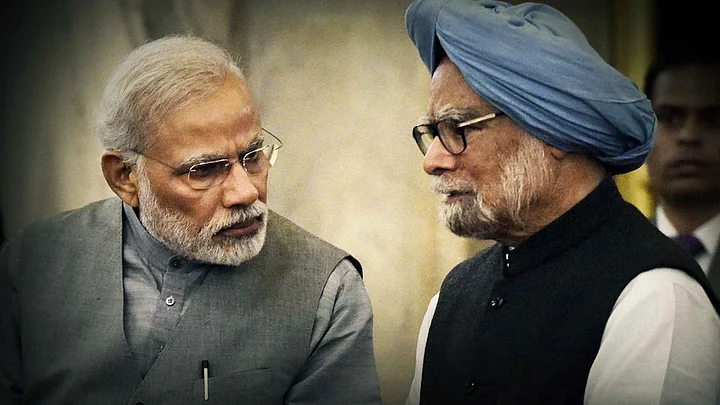Following the passing of Dr Manmohan Singh on 26 December, news outlets and social media platforms have been abuzz, celebrating his rich legacy to public life. Described variously as dignified, scholarly, and the architect of economic reforms, many have recalled how the soft-spoken economist was picked by late prime minister PV Narasimha Rao in 1991 to head the finance ministry.
Singh was given the unenviable task of turning around the country’s ailing economy which required a complete turnaround from the old, well-entrenched economic policies. He did the job with aplomb, ushered in liberalisation, and transformed the country’s economic landscape with higher growth rates and an expansion of the middle classes.
Singh’s next big moment in politics came when Sonia Gandhi relinquished her claim over the prime minister’s post and handed over the top job to the “trusted doctor” when the Congress-led United Progressive Alliance (UPA) government came to power in 2004 and then went on to win a second successive term.
The highs and lows of his tenure have been recorded in detail but in chronicling Singh’s many achievements and qualities, one cannot forget a key element of those 10 years – the unbridled freedom enjoyed by the press in reporting on political developments, the management of the then ruling coalition, and government policies.
Manmohan's Tenure Was Subject to Intense Scrutiny
The Indo-US Nuclear Treaty, which was pushed by Singh even at the cost of losing the key support of the Left parties, was subjected to intense scrutiny by experts and columnists even as the media reported the nuclear deal’s controversial journey through various stages.
Though the deal had a large number of supporters both in the media and otherwise, it was also fiercely opposed by others who debated and discussed every paragraph and line of the agreement. And this is true not just of the nuclear deal but also of other flagship policies. This is in sharp contrast to the lack of detailed reportage in mainstream media today on key policies like the recently revised criminal laws.
The media then did not hesitate to report that the Sonia Gandhi-led National Advisory Council was driving the UPA government’s rights-based legislation or that the various partners in the coalition were pulling the government in different directions. Similarly, there was endless coverage of the rocky relationship between the Prime Minister’s Office (PMO) and the Congress organisation, fuelled by the official machinery on both sides.
The detailed coverage of government functioning during Singh’s 10 years in office was also made possible by the easy access to his Cabinet colleagues and bureaucrats as there was no bar on accredited journalists from visiting the different ministry offices. The PMO in South Block was equally welcoming as its officials were ready to meet media persons to brief them on important government decisions and policies.
Singh had an articulate and affable press advisor in Sanjaya Baru who was constantly in touch with journalists and who kept an open house for them at his office. No one was scared to talk to the press. Parliament was another forum where those from the press could exchange notes with ministers and MPs over a cup of coffee. The offices of the various ministers and political parties were virtual addas where conversation flowed freely, and information was available on tap.
The Media Today Has Chosen to Forgo Its Role of Critiquing the Government
It is a different story today. Prime Minister Narendra Modi has not addressed a single press conference in the last 10 years. Access to Parliament has been severely curtailed and spaces for informal interaction between media persons and MPs have been done away with in the new Parliament building. The current PMO is staffed with bureaucrats who are virtually faceless and are discouraged from speaking to journalists except a handful who are ideologically aligned with the present dispensation.
The same template has been adopted in other ministries. The first order issued by Finance Minister Nirmala Sitharaman was to bar the free entry of accredited journalists who are only allowed in if they have a prior appointment with an official. This is a sure way of ensuring that bureaucrats do not speak informally to journalists as these conversations would now be on record.
Undoubtedly, the UPA government also had its fair share of ministers who did not take kindly to criticism and would call up media owners to lodge a complaint about what they believed was an unfair report. But, by and large, the Manmohan Singh government preferred the route of conversation with the press.
Even when the 2011 anti-corruption movement, led by Anna Hazare and activist Arvind Kejriwal, was at its peak and eventually led to the exit of the UPA government, there were no instructions to stop the media from covering the event. The 24-hour wall-to-wall coverage both by television news channels and the print media is sufficient proof of that.
But the media today has chosen, either willingly or under pressure, to forgo its role of critiquing government policies or reporting honestly on ongoing political developments. For instance, detailed coverage of the electoral bonds data in the mainstream media (with a few exceptions) has been virtually missing. This vital job was instead undertaken by smaller media outlets.
But, more importantly, Manmohan Singh himself did not shy away from facing the media. He held innumerable press conferences where he fielded difficult questions, responding with candour and honesty.
His last press conference will be remembered for his now famous declaration: “It will be a disaster if Modi becomes Prime Minister of India.”
(This article was first published in April 2024. It has been updated on account of Dr Manmohan Singh's demise.)
(The writer is a senior Delhi-based journalist. She can be reached at @anitaakat. This is an opinion piece and the views expressed are the author's own. The Quint neither endorses nor is responsible for them.)
